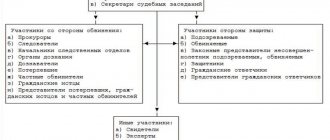1. An accused is a person in respect of whom: 1) a decision has been made to charge him as an accused; 2) an indictment has been issued; 3) an indictment has been drawn up.
2. The accused, in whose criminal case a trial has been scheduled, is called the defendant. The accused against whom a guilty verdict has been passed is called the convicted person. A defendant who is acquitted is acquitted.
3. The accused has the right to defend his rights and legitimate interests and have sufficient time and opportunity to prepare for the defense.
4. The accused has the right: 1) to know what he is accused of; 2) receive a copy of the decision to charge him as an accused, a copy of the decision to apply a preventive measure against him, a copy of the indictment, indictment or indictment; 3) object to the accusation, testify on the charge brought against him or refuse to testify. If the accused agrees to testify, he must be warned that his testimony may be used as evidence in a criminal case, including if he subsequently refuses this testimony, except for the case provided for in paragraph 1 of part two of Article 75 of this Code ; 4) provide evidence; 5) file petitions and challenges; 6) give evidence and explain in his native language or a language he speaks; 7) use the help of a translator for free; use the assistance of a defense lawyer, including free of charge in cases provided for by this Code; 9) have meetings with the defense lawyer alone and confidentially, including before the first interrogation of the accused, without limiting their number and duration; 10) participate, with the permission of the investigator or inquiry officer, in investigative actions carried out at his request or the request of his defense attorney or legal representative, familiarize himself with the protocols of these actions and submit comments on them; 11) get acquainted with the decision on the appointment of a forensic examination, pose questions to the expert and get acquainted with the expert’s conclusion; 12) upon completion of the preliminary investigation, get acquainted with all the materials of the criminal case and write out any information and in any volume from the criminal case; 13) make copies at your own expense from the materials of the criminal case, including using technical means; 14) bring complaints against the actions (inaction) and decisions of the inquiry officer, the head of the inquiry unit, the head of the inquiry body, the inquiry body, the investigator, the prosecutor and the court and take part in their consideration by the court; 15) object to the termination of a criminal case on the grounds provided for in part two of Article 27 of this Code; 16) participate in the trial of a criminal case in the courts of the first, second, cassation and supervisory instances, as well as in the court’s consideration of the issue of choosing a preventive measure in relation to him and in other cases provided for in paragraphs 1-3 and 10 of part two of Article 29 of this Code ; 17) get acquainted with the minutes of the court session and submit comments on it; 18) appeal the verdict, ruling, court order and receive copies of the appealed decisions; 19) receive copies of complaints and presentations brought in a criminal case and file objections to these complaints and presentations; 20) participate in the consideration of issues related to the execution of the sentence; 21) defend themselves by other means and methods not prohibited by this Code.
5. Participation in a criminal case of a defense attorney or legal representative of the accused does not serve as a basis for restricting any right of the accused.
6. During the first interrogation of the accused, the investigator or interrogating officer explains to him the rights provided for by this article. During subsequent interrogations, the accused is repeatedly explained his rights provided for in paragraphs 3, 4, 7 and 8 of part four of this article, if the interrogation is conducted without the participation of a defense lawyer.
Article 47 of the Code of Criminal Procedure of the Russian Federation. Accused (current version)
1. The concept of an accused in this article of the Code of Criminal Procedure is used in a narrow, technical-legal sense, when an accused is a person against whom a decision has been made to charge him as an accused or an indictment. However, as the Constitutional Court of the Russian Federation indicated, “by accusation in the sense of Article 6 of the Convention, the European Court of Human Rights understands not only the official notification of the accusation, but also other measures related to the suspicion of committing a crime that entail serious consequences or significantly affect position of the suspect... i.e. considers it necessary to proceed from a substantive, rather than formal, understanding of the accusation... In order to implement the said constitutional right (to the assistance of a defense attorney - A.S.), it is necessary to take into account not only the formal procedural, but also the factual position of the person against whom public criminal prosecution is being carried out. At the same time, the fact of criminal prosecution and, consequently, accusatory activities directed against a specific person can be confirmed by an act of initiating a criminal case against this person, conducting investigative actions against him (search, identification, interrogation, etc.) and other measures taken in order to incriminating him or indicating the existence of suspicions against him (in particular, an explanation in accordance with Article 51 of the Constitution of the Russian Federation of the right not to testify against oneself). Since such actions are aimed at identifying facts and circumstances incriminating the person under criminal prosecution, he should be immediately given the opportunity to seek help from a lawyer (defender). This provides conditions that allow this person to obtain a proper understanding of his rights and obligations, the charges brought against him and, therefore, to effectively defend himself and guarantee in the future against the recognition of evidence obtained during the investigation as inadmissible.” Thus, in relation to ensuring the accused’s right to defense, there is a broad concept of the accused, used in constitutional and international law, when the accused means any person against whom incriminating actions are taken.
———————————
See: Clause 3 of the reasoning part of the Resolution of the Constitutional Court of the Russian Federation of June 27, 2000 N 11-P “In the case of verifying the constitutionality of the provisions of part one of Article 47 and part two of Article 51 of the Criminal Procedure Code of the RSFSR in connection with the complaint of V.I. Maslova" // RG. 2000. July 4th. N 128.
2. The right to know what he is accused of and to have sufficient time and opportunity to prepare for his defense is ensured to the accused by the following provisions of this Code:
1) the charge must be brought against the person no later than 3 days from the date of the decision to charge him as an accused (Part 1 of Article 172). This corresponds to the right of the accused to receive a copy of the decision to charge him as an accused (clause 2, part 4, article 47). With this, it can be concluded that a copy of this resolution should be served or sent to the accused not at the time of arraignment, but immediately after its issuance, if the location of the accused is known;
2) the accused has the right to familiarize himself with documents that confirm the legality and validity of the application of procedural coercive measures to him, the decision on which is made by the court;
———————————
See: Determination of the Constitutional Court of the Russian Federation of May 12, 2003 N 173-O “On the complaint of gr. Kovalya S.V. for violation of his constitutional rights by the provisions of Articles 47 and 53 of the Code of Criminal Procedure of the Russian Federation” // RG. 2003. July 10. N 135.
3) the materials of the criminal case completed by the investigation must be presented to the accused in custody and his defense attorney no later than 30 days before the end of the deadline for detention established by Parts 2 and 3 of Art. 109 of the Code of Criminal Procedure (see commentary to the said article).
If, after the completion of the preliminary investigation, the materials of the criminal case were presented to the accused and his defense attorney later than 30 days before the end of the maximum period of detention, then upon its expiration the accused is subject to immediate release. At the same time, the accused and his defense attorney retain the right to familiarize themselves with the materials of the criminal case (Parts 5, 6, Article 109);
4) the right of the accused and the defense attorney to make copies at their own expense from the materials of the criminal case (clause 13, part 4 of the commented article) applies not only to the end of the preliminary investigation, but to all cases when the investigator or interrogating officer, as well as the court, are obliged to present them with those or other materials of the case (protocol of detention as a suspect, resolution ordering an examination, expert opinion, protocols of investigative actions carried out at their request). As follows from a number of decisions of the Constitutional Court of the Russian Federation (Resolutions of November 13, 1995 N 13-P, of April 29, 1998 N 13-P, of March 23, 1999 N 5-P, of February 14, 2000 N 2-P, Determinations dated December 21, 2000 N 285-O, dated December 18, 2003 N 429-O, dated February 24, 2005 N 133-O, dated April 19, 2007 N 343-O-P and dated November 15, 2007 N 924-О-О), provisions of clauses 12 and 13, part 4 of art. 47 of the Code of Criminal Procedure of the Russian Federation does not limit the right to familiarize oneself with the materials of a criminal case to familiarization only with certain specific documents. These rules do not exclude the right of the accused to make copies of the material evidence available in the case file, such as, for example, video recordings that contain information relevant to establishing certain circumstances of the case;
———————————
See: Determination of the Constitutional Court of the Russian Federation of November 15, 2007 N 924-О-О “On the complaint of gr. Kozlova D.B. for violation of his constitutional rights, clause 13, part 4, art. 47, paragraph 1, part 2, art. 75, part 1 art. 285 of the Code of Criminal Procedure of the Russian Federation and clause 1, part 1, art. 6 Federal Law “On operational investigative activities”.
5) in practice, the question also often arises: is the investigator or interrogating officer, at the request of the accused, obliged to certify copies of documents and protocols from the case materials that the latter takes? It seems that there is such an obligation - it follows from the public nature of the criminal process. Otherwise, this right of the accused is devalued, because it becomes difficult for him to appeal against the actions of the investigator, interrogating officer with a presentation to the prosecutor, to the court, etc. uncertified copies of documents, the origin of which is therefore unknown;
6) consideration of a criminal case in a court hearing cannot begin earlier than 7 days from the date of delivery to the accused of a copy of the indictment or indictment (Part 2 of Article 233).
3. The right to object to the accusation (clause 3, part 4, article 47) presupposes the accused putting forward arguments in his defense, which may consist of both pointing out factual circumstances and putting forward exculpatory versions. By virtue of Part 2 of Art. 14 The burden of refuting the arguments put forward in defense of the suspect or accused lies with the prosecution. Thus, the subject of testimony that the accused has the right to give includes not only information about the facts, but also their assessment, including assumptions and versions of the defense, which the prosecutor, as well as the court, are obliged to check in full, and the prosecutor also has the responsibility the burden of refuting them. If any exculpatory version of the accused is not refuted by the evidence, he must be found not guilty.
4. The accused has the right to refuse to give any testimony (clause 3, part 4, article 47). This right is explained by the fact that the accused is not obliged to prove his innocence, and the burden of proving guilt lies with the accuser (Part 2 of Article 14). Associated with this right is a previously unknown prohibition in our legislation on the repeated interrogation of the accused if he refuses to testify at the first interrogation (Part 4 of Article 173).
5. The right to present evidence is ensured, in addition to giving testimony and presenting evidence by the accused, also by the right to submit motions (clause 5, part 4, article 47). Fundamentally important in this regard is the provision on the obligation of the investigator to satisfy requests for questioning witnesses, conducting forensic examinations and other investigative actions, if the circumstances for which they request to be established are important for the given criminal case (Part 2 of Article 159), as well as that the court does not have the right to refuse a request for questioning at a court hearing of a person as a witness or specialist who has appeared in court at the initiative of the parties (Part 4 of Article 271).
6. According to paragraph 9 of part 4 of the commented article, the accused has the right to have meetings with the defense lawyer alone and confidentially, including before the first interrogation of the accused, without limiting their number and duration. It should be borne in mind that the rule on limiting the duration of a meeting by an interrogating officer or investigator to more than 2 hours in case of the need to carry out procedural actions applies only to the suspect (Part 4 of Article 92), but not to the accused.
7. The confidentiality of meetings between the accused and the defense attorney is ensured by the investigator, the inquiry officer, the inquiry body, the court, and the administration of places of detention. According to Part 2 of Art. 18 Federal Law of July 15, 1995 “On the detention of suspects and accused of committing crimes” “meetings of a suspect or accused with his defense attorney may take place under conditions that allow the EMPLOYEE OF THE PLACE OF DETENTION (emphasis added - A.S.) see them, but not hear them." Does this mean that the ban on hearing a conversation between a suspect or accused and a defense lawyer applies only to “employees of the place of detention”, and not to other law enforcement officers? Some authors believe that “the subjects of the investigation have the right to assign and carry out operational investigative measures against a lawyer and his client, including during their confidential meetings.” It is not entirely clear on what this, to put it mildly, strange recommendation is based, since the right of the accused and the defense attorney to confidentiality is addressed to an indefinitely wide range of subjects, including (and above all!) all “subjects of the investigation.”
———————————
See: Garmaev Yu.P. The limits of the powers of a defense attorney in criminal proceedings and typical offenses committed by lawyers. Practical commentary on legislation // https://www.businessmix.ru/comm.php?id=4703.
The duration of meetings between the accused and the defense lawyer is actually limited by the Internal Regulations in Places of Detention (Clause 15, Article 16 of the Federal Law “On the Detention of Suspects and Accused of Crimes”).
8. The accused has the right to rehabilitation (see the commentary on him to Chapter 18). One of its manifestations is the right of the accused to object to the termination of the criminal case on the grounds provided for in part two of Article 27 of the Code of Criminal Procedure.
9. One of the guarantees of adversarial proceedings and the right of the accused to defense is the right of the accused (suspect) and his legal representative and defense attorney to participate in court hearings when the court is considering the issue of choosing preventive measures in relation to him in the form of detention or house arrest, bail, extension of the period of detention, when the court decides on the placement of a suspect, accused, who is not in custody, in a medical or psychiatric hospital for a forensic medical or forensic psychiatric examination, respectively (clauses 1 - 3 and 10, part 2 Article 29, Part 2, Article 106, Part 4, Article 108, Part 2, Article 203).
10. The right to defend oneself by other means and methods not prohibited by this Code (clause 21, part 4 of the commented article). See paragraph 6 of the comment. to Art. 53 of this Code.
Comment source:
Ed. A.V. Smirnova “COMMENTARY ON THE CRIMINAL PROCEDURE CODE OF THE RUSSIAN FEDERATION” (ARTICLE BY ARTICLE), 5th edition
SMIRNOV A.V., KALINOVSKY K.B., 2009
His responsibilities
Along with rights, the accused also has responsibilities that must be observed. These include:
- expose yourself and prove your innocence;
- appear when summoned by officials participating in the investigation process;
- comply with the conditions for applying coercive measures against him, including suppression;
- do not threaten witnesses or other participants in the process;
- not destroy evidence or otherwise interfere with the investigation of the case;
- not to make false denunciations against other participants in the proceedings;
- comply with orders related to personal guarantees or payment of bail.
Art. 47 of the Code of Criminal Procedure of the Russian Federation does not contain them, but in the commentary to Art. 46 of the Code of Criminal Procedure of the Russian Federation states that they are the same as those of the suspect.
If rights are violated
The principle of ensuring the accused or suspect the right to defense is fundamental and enshrined in the legislation of the Russian Federation, therefore its violation entails certain sanctions for those who did it.
The legal basis for ensuring the accused or suspect's right to defense is Art. 48 and the Constitution of the Russian Federation.
Also, for knowingly unlawful pronouncement of a sentence or other court decision against the accused, criminal liability is provided for under Art. 305 of the Criminal Code of the Russian Federation.
The same will happen if he is sentenced to illegal imprisonment or in cases where such unlawful actions of officials entailed grave consequences for the accused himself.
What the accused is not entitled to
The rights of the accused under Article 47 of the Code of Criminal Procedure of the Russian Federation are secured, but there are things to which he does not have the right. For example, according to Art. 102 of the Code of Criminal Procedure of the Russian Federation, if he was given a penalty in the form of a written undertaking not to leave the place, then he has no right to violate the terms of this document.
If a preventive measure such as house arrest was chosen against him, then he does not have the right to violate the requirements of Federal Law No. 103, which determines the conditions for its execution.







